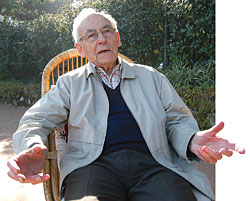Odd Hoftun, a hydropower engineer from Norway, came to Nepal in 1958 to build Tansen Hospital and later set up Butwal Technical School. Hoftun was back in Kathmandu recently and talked to Nepali Times about lessons learnt in hydropower development in Nepal.
|
|
Odd Hoftun: The things I have seen in Nepal have overwhelmed me. Kathmandu is overcrowded and growing beyond its limits. I was visiting Butwal, and it is also a changed place. Many of these changes are positive. I am an optimist. I don't see things going backwards in Nepal. One does wish, however, that certain things would move quicker.
What lessons has Nepal learnt, or not learnt, about hydropower in the last 17 years?
We have learnt that hydropower development takes time, but also requires a lot of investment. It takes realistic planning, and big projects are simply unrealistic. My philosophy has been to start small and grow over time. Changes in legislation have been very favourable. Some infrastructure has been developed. Opening up to the private sector was unthinkable 20 years ago, but this has now become what many people think of as a solution. The introduction of small hydropower schemes has proved that this it is one way in which hydropower can be developed in Nepal. If you add up all the micro-plants, there is quite a lot of capacity even with them.
There was a time when people used to think only foreign investors and foreign experts could develop hydropower in Nepal. We know that is no longer true because Nepal now has the capability and resources to handle these things. Companies like Himal Hydro, Nepal Hydro and Electric, and Butwal Power Company all started as small companies. Today they have grown and become internationally competitive.
What is still lacking is an understanding from the government on how to work with the private sector. There has to be an element of trust. It seems to me that there's scope for private investment also in power distribution. Whatever the private sector is doing in hydropower, or in power distribution, there's an urgent need for a realistic and predictable government framework. It shouldn't be that one minister says one thing, then another comes in and says something else.
Can politics be blamed?
They say people get the politicians they deserve, so I wouldn't blame them. I can't come here and offer a prescription for how things should be done. I would just like to say that one must be realistic, there must be trust, and there must be consistency over the years. There was a time when I thought the Melamchi water project should become a public-private enterprise. The government was supportive of the idea, but when outside financing institutions got involved the idea was dropped. I was sorry about that because it could have been a multi-purpose regional development model so that not just the city people would benefit.
Is the Indian market a blessing or a curse?
It can be both. One must look 20 years ahead to make something like that work. The potential is tremendous. In Nepal, big hydropower projects are much talked about, but no one is even thinking about transmission lines across the border or within the country. It is difficult for private parties to run the grid. India is in desperate need of clean energy and Nepal can provide it. That said, just because there is demand in India, doesn't mean Nepal should rush into big projects. In some places the small hydro concept is ideal. Ultimately, however, these small power plants need to be connected to the grid, which is why they are good for rural development. The big projects take a long time to start, and the rush upsets the local economy. Big projects should and must be undertaken, but that is only possible through export to India. However, there has to be a fair agreement and a very high level of trust between the two nations for something like that to work.
How would you advise the Norwegian government about investing in Nepali hydropower?
We have hydropower in Norway that has been developed, while in Nepal it is just starting. This is the time for Norway to invest in Nepal. There are many qualified and experienced Nepali people in the legal, financial and technical fields who can take care of Nepali interests. So Nepal would be an ideal partner for cooperation from the Norwegian side.



